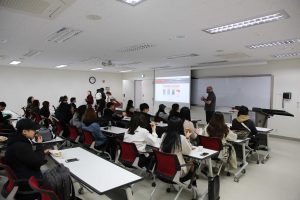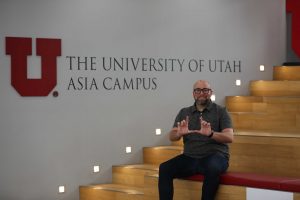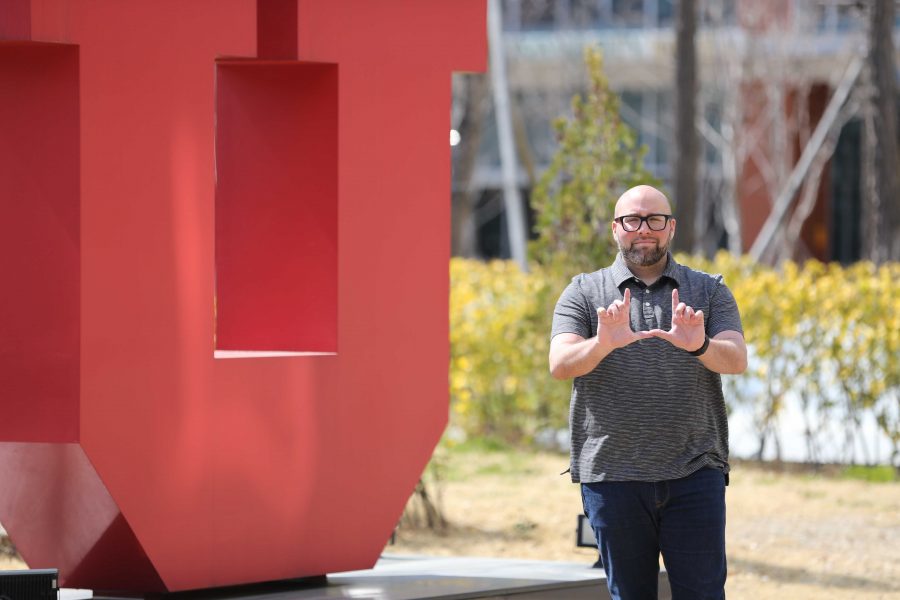Travis James Ciaramella, an academic advising coordinator from the Department of Communication at the University of Utah’s Salt Lake City campus, visited the University of Utah Asia Campus (UAC) on April 1. The U’s Department of Communication sends an academic advising coordinator once a year to visit UAC. The purpose of the visit is to meet with the UAC students and provide information about the SLC campus and help students feel prepared for their transition there.
“This is my second visit to UAC. I was here back in the fall of 2015. I cannot believe how much it has grown. It feels like a completely different city. And even campus has changed so much. It is wonderful to see that the U has a strong presence here,” Ciaramella said.

Students who are communication majors had the opportunity to get advice from Ciaramella about how to manage their academic career and what classes they would need to take at the SLC Campus.
Most of the students in the Department of Communication at UAC are interested in media, advertisement and promotion. The Department of Communication’s curriculum has three tracks: strategic communication, journalism and communication studies. Few students are majors in journalism and communication studies — most of them choose to major in strategic communication.
Ciaramella presented information sessions for communication majors from April 3 to April 5 in U305 at UAC.
Eun-Byeol Cho, a junior majoring in the communication, said that she thought it was beneficial to know systems for her academic career. “I didn’t know about CPT and OPT which I need to do before going to the SLC. I am not a U.S. citizen, so I should prepare for it,” Cho said.
CPT is “Curricular Practical Training” for students who are currently enrolled in school. OPT is “Occupational Practical Training” for students who complete a degree program. These are the programs for a non-U.S. citizen who wants to do an internship program in the U.S.
Su-Bin Hong, a sophomore majoring in communication, said the information session was a great opportunity for her to talk with the SLC campus’s academic advising coordinator. “It was beneficial for me to spend time with Travis. Thanks to him, I could know more detail [about] the SLC and internship programs,” Hong said.
Seo-Yeon Kang, a first-year communication student, said that the meeting with Ciaramella made her ready to go to the SLC campus. “I felt that I have much time before going to the SLC, I should prepare by myself from now on,” Kang said.

The largest number of UAC students are majors in communication. Even though the Department of Communication has three professors and is the biggest department in UAC, many students have complaints about the lack of some courses and opportunities to work outside of campus. UAC should interact with SLC more and more to make the departments larger to encompass the various curriculum.
Students taking courses at UAC face limitations. Some have voiced concerns about what courses they need to take before they go to SLC and how they need to manage their academic career to prepare for graduation. As long as faculty members of the SLC campus come to UAC for students every semester, UAC students will not need to stress during the process of going over to the SLC campus.
Ciaramella stated that UAC is simply an extension of the SLC campus, and UAC students are just as important and valuable as the students in SLC. “As advisors, we hope to continue connecting with our students at UAC and providing as many resources as possible to aid in their successful transition to the SLC campus,” Ciaramella said. “Make the most of your time as an undergraduate student! Engage with your professors, take skill courses, explore internship opportunities and volunteer.”


